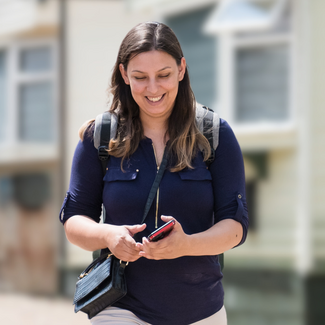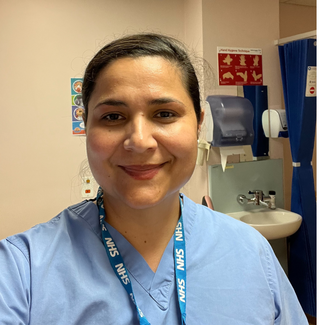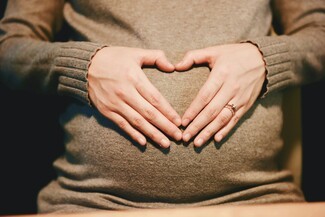Measles and whooping cough - looking after our family’s health

“Coming from a Gypsy Roma background, I know some of the challenges in accessing healthcare.”
There has been a significant rise in the number of people catching measles and whooping cough in England, which both spread very easily among children and adults that are not vaccinated. But what do these illnesses mean for our health and how do we protect our families?
“Many people have lots of questions about these diseases” says Dr Floriana Ellis, a GP in Bedfordshire. Eva Bangova, Equity Development Manager at Alliance for Better Care, agrees: “Coming from a Gypsy Roma background, I know some of the challenges in accessing healthcare.”

Whooping cough
Whooping cough is a serious infection that causes long bouts of coughing, which usually has a distinctive ‘whoop’ sound (gasping for breath) that may last for weeks or months. You might also have a runny nose and sore throat and cough up a thick mucus which can make you vomit.
In babies under 12 months old, whooping cough can be dangerous, increasing chances of dehydration, breathing difficulties, pneumonia and seizures. In rare cases whooping cough can be fatal, and sadly there have been 10 infant deaths since the current outbreak began in November last year.
Measles
Despite many people thinking it’s ‘just a rash,’ measles is a severe illness that can cause lifelong complications with young children and pregnant people at high risk.
Dr Ellis says:
“Until 1963, measles was the leading cause of death in children. Thankfully things have changed since then due to vaccination, but one in five people may still need a hospital visit. And one in fifteen patients can experience complications from measles like meningitis and sepsis. Measles usually starts with cold-like symptoms, followed by a rash of flat or slightly raised spots a few days later. They start on the face before spreading down the body and can join together to make blotchy patches. On paler skin, the rash can look red or reddish-brown and on darker skin, the rash might look browner and be harder to see. It might be very pigmented and feel bumpy.”

RSV (Respiratory syncytial virus)
RSV affects the airways and lungs and symptoms include a cough, sore throat, sneezing and a runny or blocked nose. It usually gets better by itself, but in babies it can cause a lung infection called bronchiolitis, which can make it hard to breathe or feed. Around 20,000 babies are admitted to hospital with bronchiolitis each year, it can be fatal with some babies needing intensive care.
Protection against these diseases
The NHS provides vaccinations free of charge to protect people against the most serious diseases.
Dr Ellis explains:
“Before becoming a family doctor, I was a paediatrician and saw many children with infections like measles. Some were extremely unwell and even with all possible treatments, nothing could be done. However, these outcomes could have been prevented if the child had been immunised. It’s easier to prevent an infection than it is to treat it.”
Two doses of the MMR vaccine provides effective and life-long protection against measles as well as mumps and rubella. The first dose is usually given to one year old babies, followed by the second dose when the child is aged about three years and four months. Adults and children who have not had one or both doses of the MMR vaccine can catch up anytime at their GP surgery.
If you are pregnant, you will be offered the whooping cough vaccination around the time of your mid-pregnancy scan (usually 20 weeks) but you can receive it from 16 weeks from a midwife or GP surgery. If you have missed your vaccine, you can still have the vaccine later. It may be less effective if you have the vaccine close to when your baby is born. The vaccine is offered in each pregnancy as the immunity from the vaccine passes to your baby and protects them until they are 8 weeks old and able to have their 6-in-1 vaccine. This vaccine protects against 6 diseases including whooping cough and is given when babies are 8, 12 and 16 weeks old.
You will also be offered the RSV vaccine in each pregnancy. Getting vaccinated as soon as possible from 28 weeks will provide the best protection for your baby. But the vaccine can be given later if needed, including up until you go into labour.

Eva has supported communities that are often wary of vaccinations given to children or during pregnancy. She says:
“Rumours spread quickly amongst small communities that rely on kinship and trust. Misinformation is likely to stem from negative past experiences with healthcare. But trusted health professionals can build open, honest relationships, answer questions and remove doubts. NHS statistics, along with other research can reassure people and alleviate concerns.”
Dr Ellis adds: “Vaccines aren’t mandatory, but please consider the potential complications if they aren’t protected. And you can always ask a health professional if you’re unsure about anything – we’re here to help and answer your questions.”
Register with a GP surgery
You can register as a temporary resident with a GP surgery, if you expect to live for up-to-three months, in an area that is different to your GP surgery. You can also register free of charge with any GP surgery if you or your family have never registered with a GP surgery or have moved to a new area. Even if you don’t have ID, proof of address or immigration status. You can find out more about registering with a GP surgery by phoning the NHS England contact centre on 0300 311 2233.
Improving health care for our communities
“Everyone is entitled to have a GP and I strongly recommend you register with a surgery, especially if you’re vulnerable or have any health conditions. We need to get healthcare sooner rather than later, which doesn’t always happen in every community.” Eva adds,
“We should all be able to access care in an equal, safe and effective way. By working together, we can strengthen trust and help to prevent diseases at early stages.”
During the COVID pandemic, Eva arranged for health professionals to visit communities at Gypsy, Roma and Traveller sites, homeless and domestic violence shelters, refugee and asylum seekers accommodation and prisons throughout Surrey and West Sussex to give advice.
“The pandemic highlighted the need for us to get better at supporting people from all walks of life. Our focus is preventative care - to make sure every contact a person has with a health professional builds trust and understanding. Historically, people may have felt they had ’fallen through the cracks’ through no fault of their own, so we aim to improve how people manage their health by making services more accessible,” said Eva.
“Breaking down barriers people may face and education around what’s available, can empower people to make decisions that are right for them and their loved ones.”
NHS / TT News
(Photographs courtesy of the NHS unless otherwise credited)